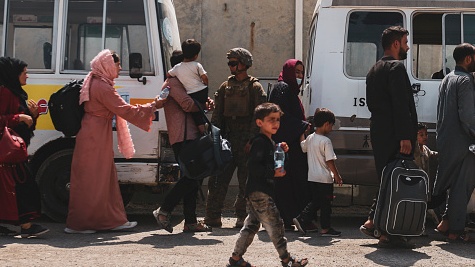Pentagon ‘blames UK’ for deadly Kabul airport suicide attack, leak reveals
US kept open Abbey Gate to help UK evacuation effort - despite imminent threat of attack

A free daily email with the biggest news stories of the day – and the best features from TheWeek.com
You are now subscribed
Your newsletter sign-up was successful
The suicide attack at Kabul airport last week took place after the US decided to keep open a gate at the airport to assist the UK with its evacuation, leaked notes have revealed.
The UK-US special relationship “came under strain” last night after leaked Pentagon documents suggested the US had kept open Kabul airport’s Abbey Gate so that UK evacuation efforts could continue “despite knowing there was a high risk of attack”, reported The Times.
Senior government sources and Tory MPs have accused Washington of trying to “shift the blame” after it emerged that senior US military figures had wanted to close the gate on Thursday, just hours before the deadly bombing, said the paper.
The Week
Escape your echo chamber. Get the facts behind the news, plus analysis from multiple perspectives.

Sign up for The Week's Free Newsletters
From our morning news briefing to a weekly Good News Newsletter, get the best of The Week delivered directly to your inbox.
From our morning news briefing to a weekly Good News Newsletter, get the best of The Week delivered directly to your inbox.
Classified notes of calls with senior military figures and politicians obtained by Politico show Lloyd Austin, the US defence secretary, told his international counterparts on Wednesday morning last week to make preparations for a “mass casualty event”.
During the same meeting, General Mark Milley, chair of the Joint Chiefs of Staff, warned of “significant” intelligence indicating that Islamic State’s Afghan affiliate, Isis-K, was planning a “complex attack”.
Commanders calling in from the ground in Kabul warned that Abbey Gate was at “highest risk” from an attack.
On a separate call at 4pm that afternoon – or 12.30am on Thursday in Afghanistan – military and government officials were told by Rear Admiral Peter Vasley, commander of US forces in Afghanistan, that “he was looking to shut down Abbey Gate” having already closed two other gates.
A free daily email with the biggest news stories of the day – and the best features from TheWeek.com
Vasley had “discussed with the Taliban additional security measures outside the gates” which still remained open, and the commander planned to have Abbey Gate closed by Thursday afternoon, Kabul time, the site added.
Abbey Gate was “not closed on schedule” as British forces “accelerated” their withdrawal from the Baron Hotel, the main hub for evacuating UK personnel from the country, which is just a few hundred yards from the gate. The US kept the gate open to allow evacuations to continue, said Vasley, according to the leaked documents.
At 6pm, a suicide attack ripped through the crowds of civilians attempting to escape via the airport, killing hundreds of Afghans and 13 US service members.
The British evacuees had not arrived at the airport at the time of the attacks, but two British citizens were killed in the bombing: Musa Popal, a 60-year-old shopkeeper from London, and Mohamed Niazi, 29, a taxi driver from Hampshire. Niazi’s wife and their two daughters were also killed in the attack.
Following the publication of the leaked documents, Conservative MP Tobias Ellwood, chair of the Defence Select Committee, said there appeared to be an “undercurrent of blame” which was “unhelpful”.
Speaking to The Telegraph Ellwood said: “It does not add up. If the US was anticipating a mass casualty event why did they still continue processing themselves? There is an underlying current of blame which is unhelpful. It’s a distraction from the main effort of what is happening on the ground.”
The Pentagon said that Politico’s reports are “based on the unlawful disclosure of classified information and internal deliberations of a sensitive nature”, while a spokesperson from the UK Ministry of Defence said: “We continue to offer our full support to our closest ally.”